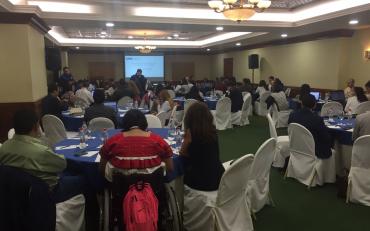*Para leer esta información en Español, por favor haga click aquí
The Latin American Network of Non-Governmental Organizations of Persons with Disabilities and their Families (RIADIS), in partnership with the Inter-Agency Standing Committee (IASC) Task Team on Inclusion of Persons with Disabilities in Humanitarian Action and the International Disability Alliance (co-chair of the Task Team), is holding a regional multi-stakeholder consultation for the Latin America Region that will be held on Thursday 3 – Friday 4 May in Quito, Ecuador.
The workshop is the third in a series of regional consultations supporting the development of the IASC Guidelines on Inclusion of Persons with Disabilities in Humanitarian Action (“the Guidelines”). Around 50 participants including organizations of persons with disabilities (DPOs), humanitarian and development stakeholders, intergovernmental organizations based in the Latin American region and government representatives of Ecuador will discuss priority areas and key components of the Guidelines, and share feedback to ensure the Guidelines will be effective and relevant in the field.
The workshop aims to:
- Review, discuss and comment on initial draft content in detail
- Identify gaps that should be addressed
- Agree on the priority areas/key components
- Collect existing information, promising practices and other relevant information from participants to support the content development of the Guidelines
- Identify how regional humanitarian actors can contribute to later phases of the Guidelines' development process, including establishing appropriate feedback mechanisms.
The Guidelines will assist humanitarian actors, governments, affected communities and organizations of persons with disabilities to coordinate, plan, implement, monitor and evaluate essential actions that foster the effectiveness, appropriateness and efficiency of humanitarian action, resulting in the full and effective participation and inclusion of persons with disabilities and changing practice across all sectors and in all phases of humanitarian action.
For more information, please see:

